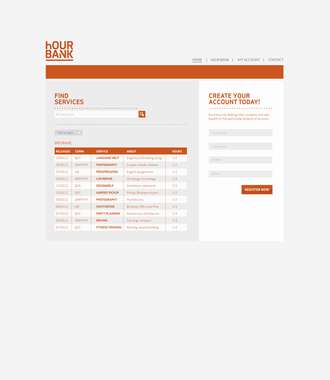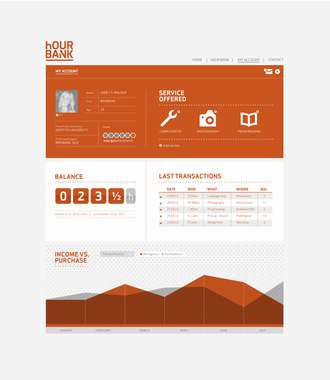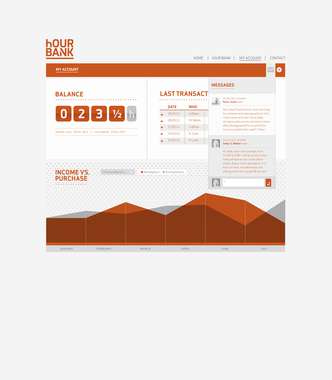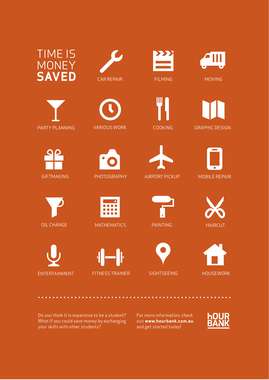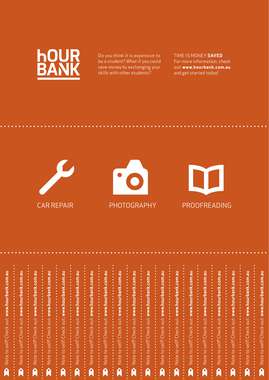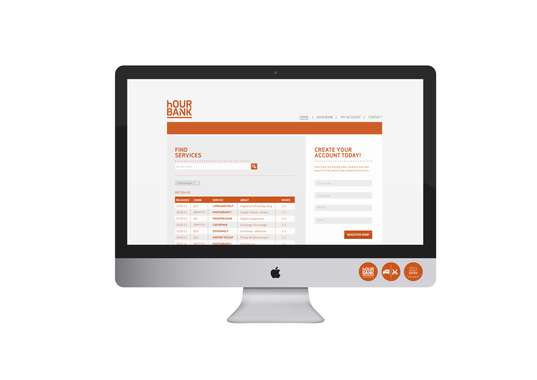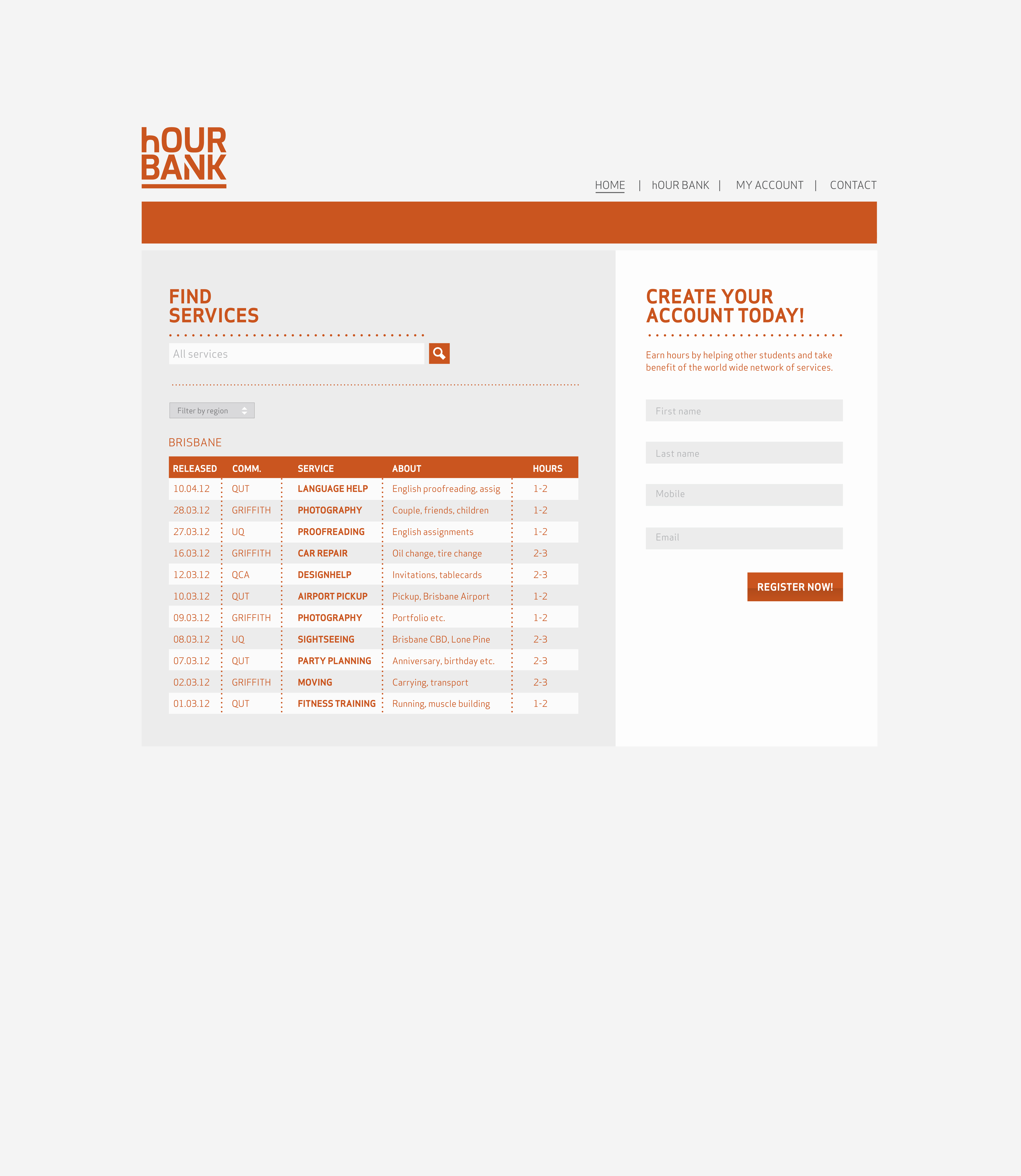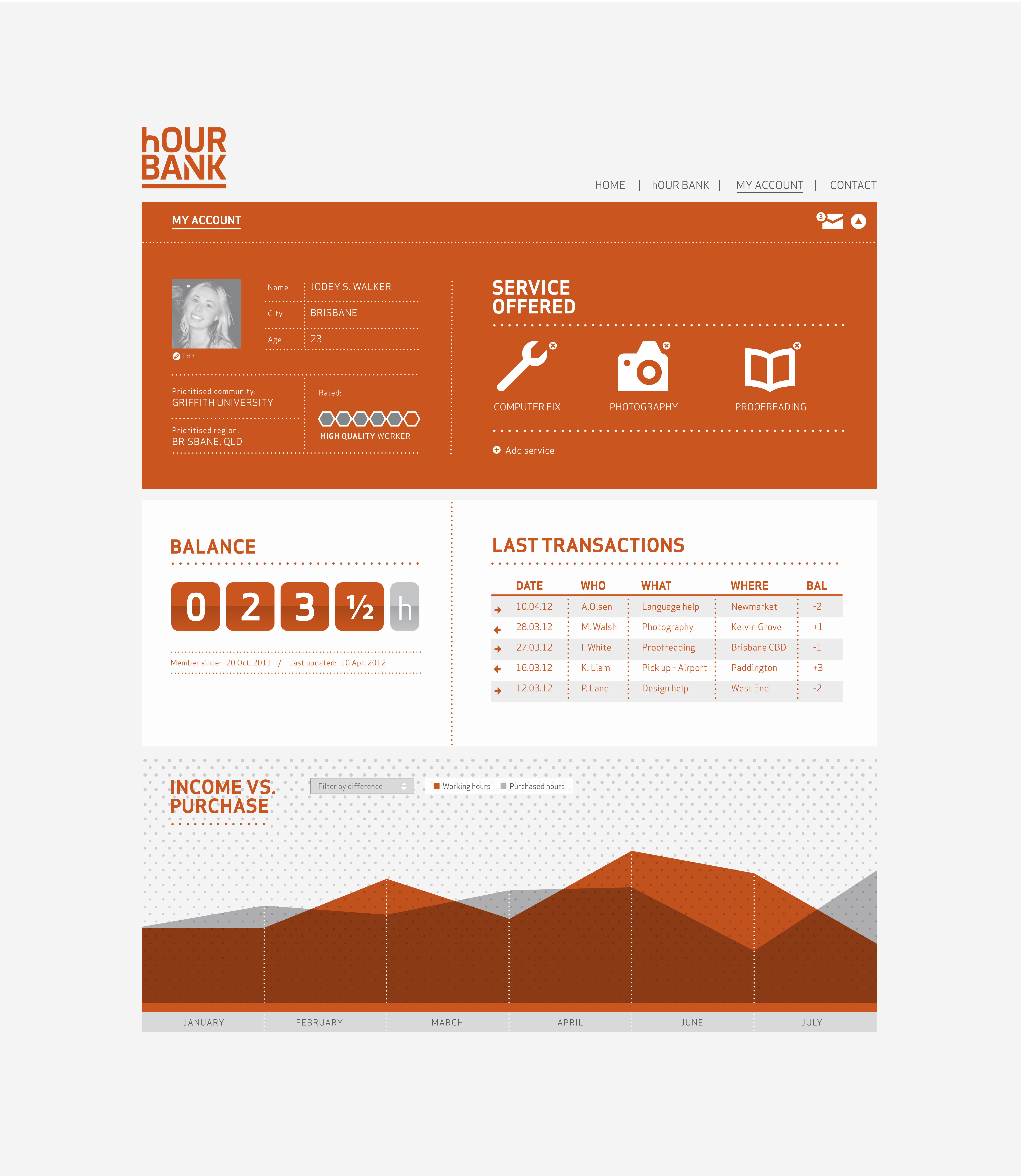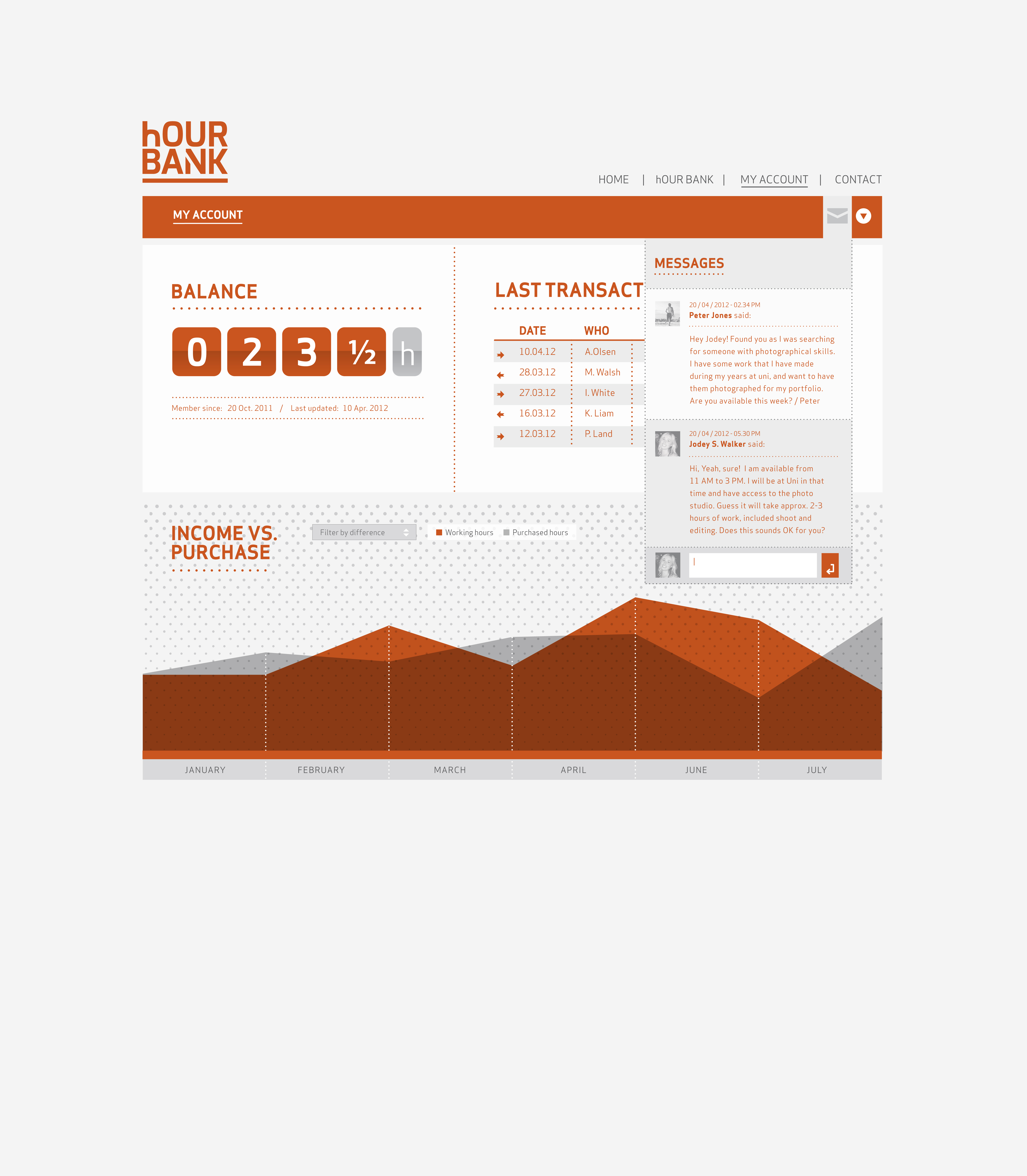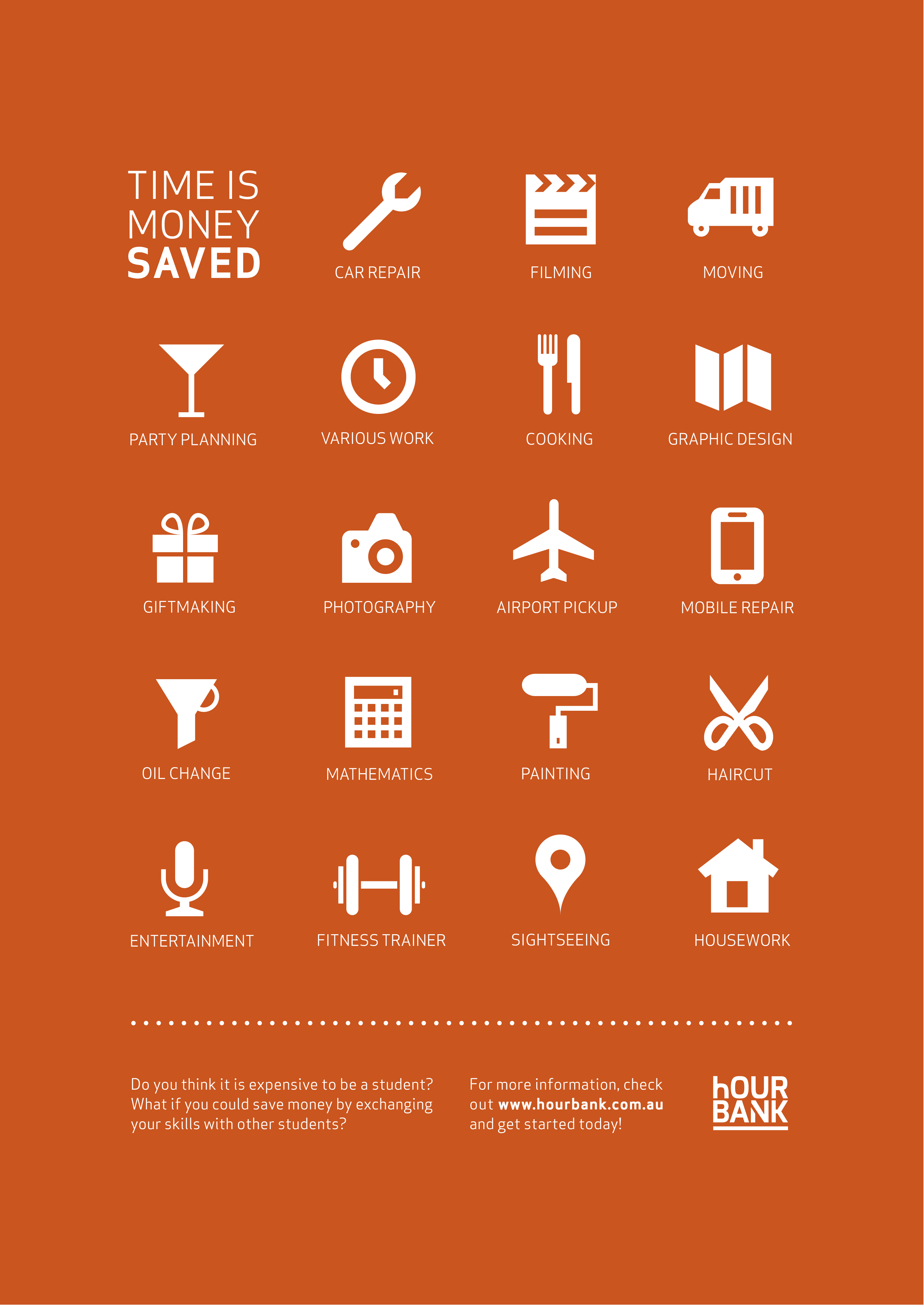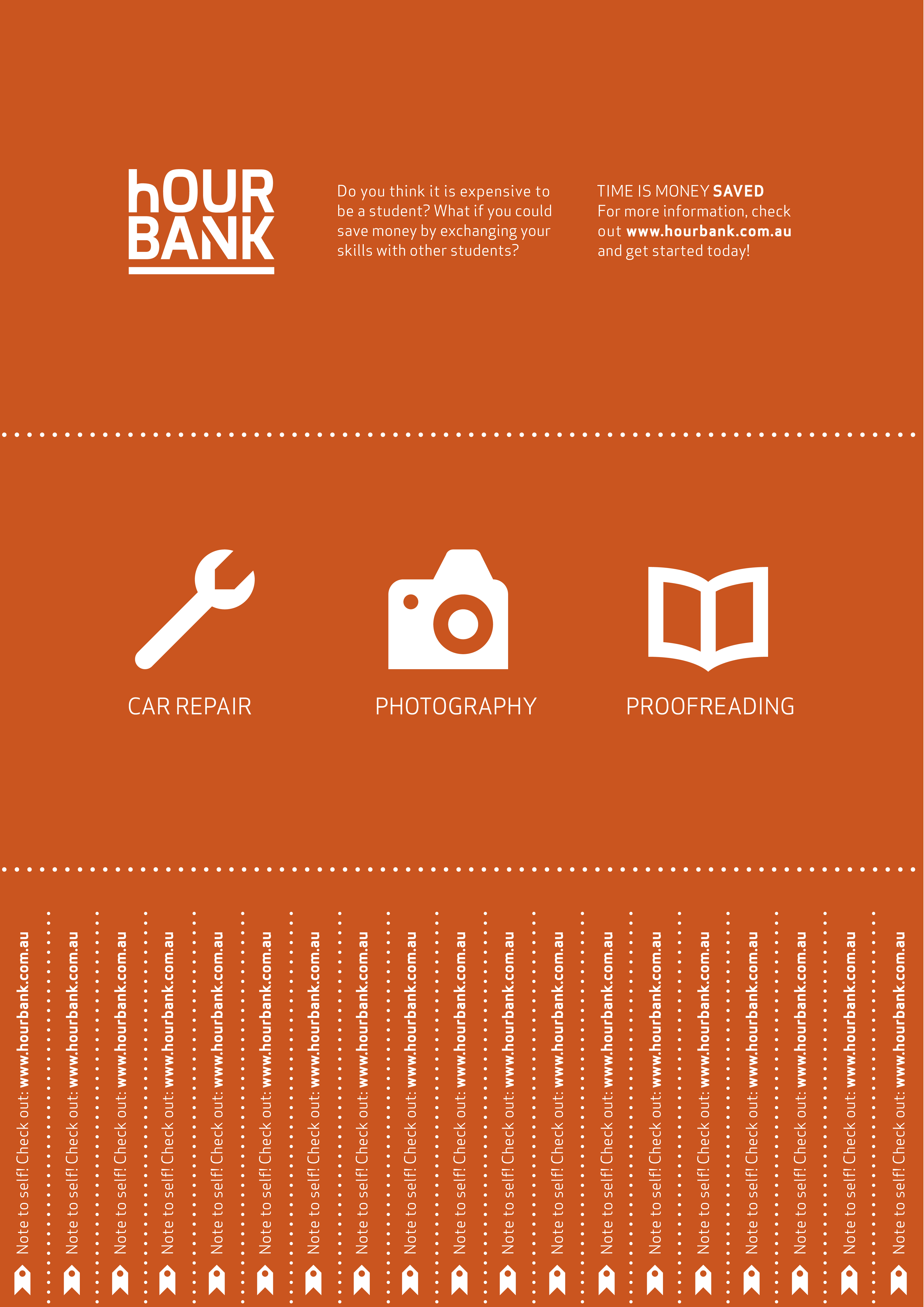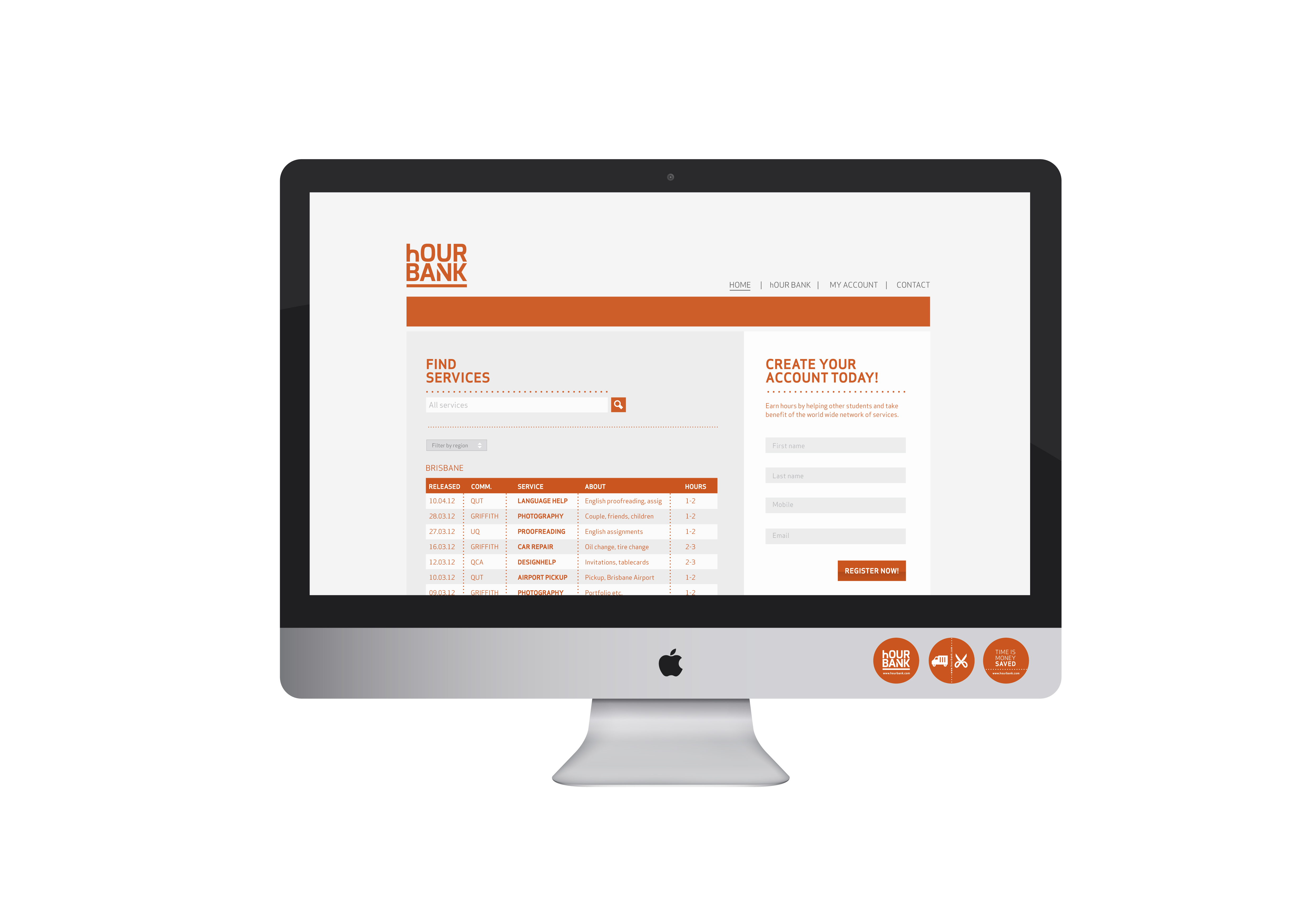HOUR BANK
by TorunnOvland
This work has been commented by 2 curator(s). Read the comments
Title
HOUR BANK
Headline
- an e-commerce and social network solution for students
Concept author(s)
Torunn Ovland
Concept author year(s) of birth
1988
Concept author(s) contribution
Idea
Concept author(s) Country
Australia
Designer(s)
Torunn Ovland
Designer(s) year(s) of birth
1988
Designer(s) contribution
Graphic Design
Designer(s) Country
Australia
Friendly Competition
Competition category
Visual communication practice
Competition subcategory
static
Competition field
academic
Competition subfield
student
Subfield description
Griffith University, Queensland College of Art - Bachelor of Design - Visual Communication Design
Check out the Debt. 2012 outlines of Memefest Friendly competition.
Description of idea
Describe your idea and concept of your work in relation to the festival outlines:
Today Australian students are overstrained with debt. Borrowing funds for education and the amount of student loan defaults are feared to cross $1 trillion by 2012.
Debt has a major impact on how they handle their life as students. One of the main issues David Greaber focuses on in his book “The First 5000 Years” is that debt can be seen as slavery. The financial environment that students find themselves in, can be seen as a kind of slavery because of the obligations they have towards their debt.
Huge student loans create a great focus on having enough money to pay their expenses, such as accommodation, food and unexpected cost such as a car repair etc. Although a part time job can get some extra monthly cash for the student, the issue about not having enough time to studying arises. These students are more likely to get mental health issues, such as anxiety and stress, during their time at university. Is it possible to change these negative outcomes? Is there any other way for students to save money, without a job obligation that will affect the study situation in a negative way?
Hour Bank is an e-commerce and social network solution for students at university level, where the members of the network can offer their services and purchase from other members. These services can be whatever they want to offer, all from language help to a car repair. From these services the members will earn hours, the currency used in the system (hence the name Hour Bank). One hour equals one hour of basic labour. The cost of a service depends on how much time the provider uses on the service, or in some cases a fixed payment will be the best solution. The hours will be in constant circulation when the members will earn and buy services from each other. Also, members will never become in debt to the system, while hours can never be credited.
Seen in a positive way, this system will not have the same time obligations that a part time job will have. Student can provide their services whenever they want.
The aim for this concept is for students to save money they elsewhere would have spent on unexpected costs that might appear, and at the same time have a community where they can seek help and be social. The different communities the members can choose to be a part of (normally the university they studying at) will be prioritised in their search after services at the website. By prioritising this feature, members are more likely to develop a social network in the nearest school environment.
What kind of communication approach do you use?
Hour Bank is a concept targeted towards students in university level and therefore distributed in channels where the target group most likely would notice it. The concept is parted in two sections; web design (user interface design), and articles to promote the network. The last part contains posters and stickers, which have been chosen as the two most effective articles. One of the two posters is designed for users to tear off a bit of paper containing website address. Making it possible for 19 persons to tear off a piece makes this solution environmentally friendly.
What are in your opinion concrete benefits to the society because of your communication?
As a designer, the expectations of social responsible solutions are more important now than it have ever been. In my opinion, the design solution for Hour Bank benefits the society because of the possibilities for making students daily life easier, both economically and socially. Satisfied students are much more likely to graduate with good results, that will gain the society when the students will become employees with the ability to pay back their student loans.
What did you personally learn from creating your submitted work?
I have always looked upon debt as something bad, and after reading the excerpts of the book by Graeber, this perception did not really change in a positive way. After making the concept and researched the term debt, I got other perspectives on the meaning of the word and what feelings it brings. As an international student, with student loan from Norway, I could never have experienced living and studying in Australia without loan from the Norwegian Government. Therefore debt is not just a word with negative associations, it is also a term that describes something positive - opportunities.
Why is your work, GOOD communication WORK?
The question of what is a good communication work is extensive. For me, good communication work is a work that makes people reconsider their normal perception of daily things. This can be done in two different ways; either showing the problem with no solution, or showing a solution without the problem. I think the last one is the solution of making a good communication work. The Hour Bank concept focuses on a solution as the main part of the rather than telling the target group the obvious problem they are facing. This combined with a design that most likely would appeal to the target audience, emphasises the concept to be a good communication work.
Where and how do you intent do implement your work?
Hour Bank will be promoted by showing posters and stickers around campuses. At a further thought, Hour Bank will be distributed at Facebook, to guide potential members to the website where they can register. Facebook, as a channel for communication, is a great way of recruiting members because of the huge amount of people that is active users.
On this stage, the concept is shown as distributed in Australia. Although, I think Hour Bank would be a great concept to release in other countries as well. Members would then have an opportunity to seek help if they are travelling overseas. Take for an example; if an Australian student is on a trip to France and need transport from the airport or a city – sightseeing, this would be a great opportunity for saving money and to get social connections. And the greatest thing, the provider of this service would earn hours to spend on things he could need.
Did your intervention had an effect on other Media. If yes, describe the effect? (Has other media reported on it- how? Were you able to change other media with your work- how?)
-
Curators Comments

Scott Townsend
The idea of trading labor instead of money through an online system is a great idea, and it has been developed by others as well. I do like this project however quite a bit, and I am curious what would happen if there was more thought in regards to how labor is actually done, for example, most of the labor trade offs in the project are physical (like a ride to an airport).
What if the labor trades could be virtual as well? Labor is not necessarily physical anymore with digital media. Is there a way that the online system could sort that out, and establish relationships in the form of trading communities that were regional national or even international? What happens when you move outside of your particular university community audience to engage other communities with people that have different resources?
Also, how would you negotiate the rate of your labor, especially if you were working in other communities that had different socio-economic standards and ideas?

Tony Credland
An interesting project that is looking for solutions to the issues of debt, i am not sure that all the issues have been solved but a good starting point. The design is suitably subtle and non judgmental giving clear information and is well explained.
To me this kind of project point to mutual support, which has a long history and is important for any community that is under pressure, in this case by the privatisation of the education system. I would be interested if this actually get put into effect as it could yield interesting results.
There are many other examples around of localised money systems like this one in Brixton, London: (http://brixtonpound.org) linked up to a network of new systems in the Transition town network: (http://www.transitionnetwork.org) who's aim is to both keep money earned locally, spent locally and to increase the concept of mutual support. Other examples date back to the 60's often referred to as LETS - Local Exchange Trading Systems.
Although to really get to the root of the student debt problem you have to look for inspiration by the Quebec students; see (http://www.stopthehike.ca) and (http://www.arretezmoiquelquun.com/).

